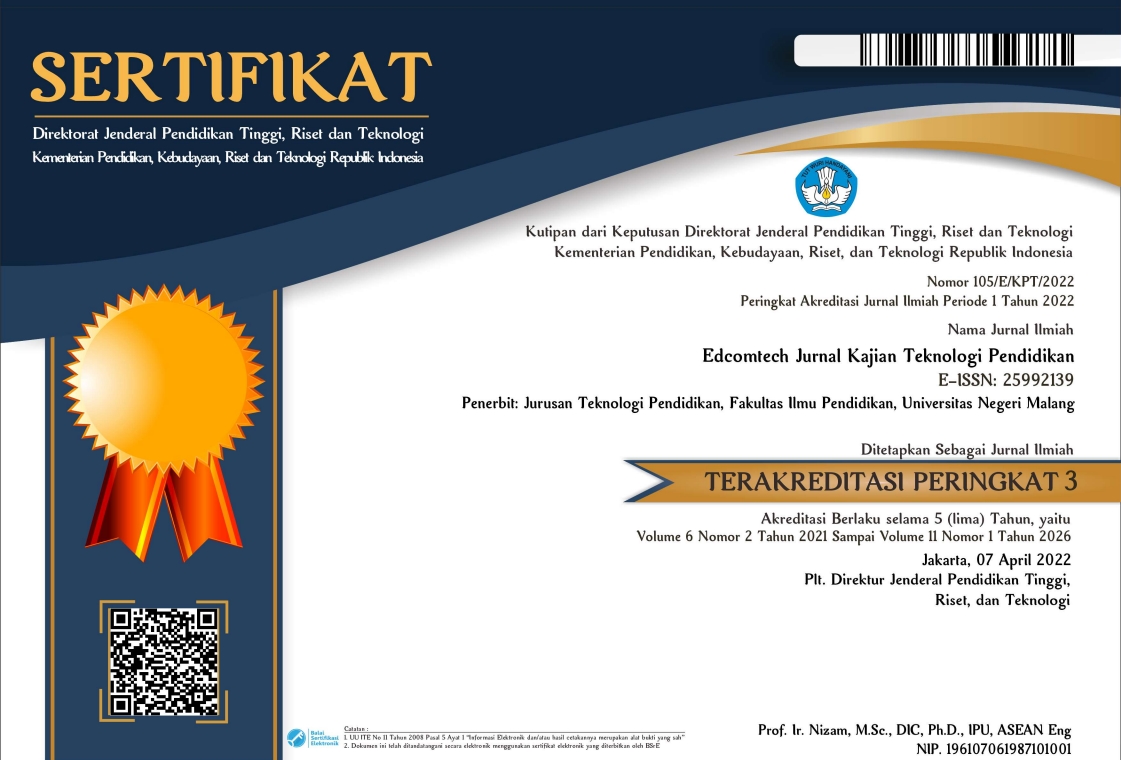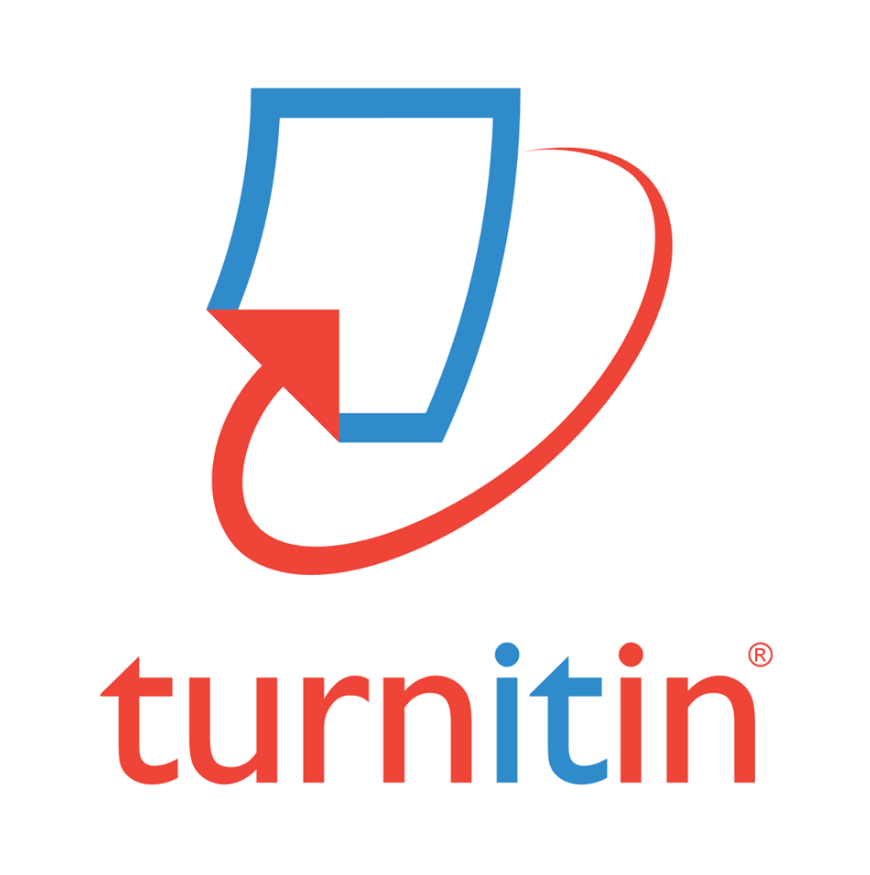Alternatif Pembelajaran Aktif di Era Pandemi melalui Metode Pembelajaran Game Based Learning
Abstract
Abstrak: Artikel ini mempunyai tujuan untuk melihat bagaimana pemanfaatan teknologi digital melalui metode pembelajaran berbasis game secara efektif di era pandemi COVID-19 dengan menggunakan pembelajaran yang menarik agar siswa yang melakukan pembelajaran tetap aktif. Jenis penelitian ini adalah penelitian literatur review dengan menggunakan studi Pustaka yang memanfaatkan literatur sebagai objek primer dalam penelitian. Dengan memanfaatkan teknologi dalam pembelajaran dengan menggunakan metode pembelajaran Game Based Learning dapat memberikan pembelajaran yang lebih aktif, menarik, efektif dan efisien selama pandemi COVID-19.
Abstract: This article aims to see how the use of digital technology through game-based learning methods is effective in the COVID-19 pandemic era by using interesting learning so that students who are learning remain active. This type of research is literature review research using literature study that utilizes literature as the primary object in research. By utilizing technology in learning using game-based learning methods, it can provide more active, interesting, effective and efficient learning during the COVID-19 pandemic.
Keywords
Full Text:
PDFReferences
Acquah, E. O., & Katz, H. T. (2020). Digital game-based L2 learning outcomes for primary through high-school students: A systematic literature review. Computers & Education, 143, 103667. https://doi.org/https://doi.org/10.1016/j.compedu.2019.103667
Akyuz, S., & Yavuz, F. (2015). Digital learning in EFL classrooms. Procedia-Social and Behavioral Sciences, 197, 766–769. https://doi.org/https://doi.org/10.1016/j.sbspro.2015.07.176
Andrew, J., Henry, S., Yudhisthira, A. N., Arifin, Y., & Permai, S. D. (2019). Analyzing the factors that influence learning experience through game based learning using visual novel game for learning pancasila. Procedia Computer Science, 157, 353–359. https://doi.org/https://doi.org/10.1016/j.procs.2019.08.177
Ariffin, M. M., Oxley, A., & Sulaiman, S. (2014). Evaluating game-based learning effectiveness in higher education. Procedia-Social and Behavioral Sciences, 123, 20–27. https://doi.org/https://doi.org/10.1016/j.sbspro.2014.01.1393
Emka, H. A. (2017). Game Edukasi Bahasa Indonesia Kelas 1 Sekolah Dasar Berbasis Android Menggunakan DGBL-ID Model. INTEGER: Journal of Information Technology, 2(1). https://doi.org/https://doi.org/10.31284/j.integer.2017.v2i1.93
Erfan, M., & Ratu, T. (2018). Meningkatkan minat dan hasil belajar mahasiswa pada perkuliahan elektronika dasar melalui digital game-based learning. Prosiding Seminar Nasional Pendidik Dan Pengembang Pendidikan Indonesia, 332–337.
Hasibuan, Z. A., Isal, Y. K., Ahmad, M., & Selviandro, N. (2011). Preservation of cultural heritage and natural history through game based learning. International Journal of Machine Learning and Computing, 1(5), 460.
Huizenga, J., Admiraal, W., Ten Dam, G., & Voogt, J. (2019). Mobile game-based learning in secondary education: Students’ immersion, game activities, team performance and learning outcomes. Computers in Human Behavior, 99, 137–143. https://doi.org/https://doi.org/10.1016/j.chb.2019.05.020
Kiili, K. (2005). Digital game-based learning: Towards an experiential gaming model. The Internet and Higher Education, 8(1), 13–24. https://doi.org/https://doi.org/10.1016/j.iheduc.2004.12.001
Kiili, K., Moeller, K., & Ninaus, M. (2018). Evaluating the effectiveness of a game-based rational number training-In-game metrics as learning indicators. Computers & Education, 120, 13–28. https://doi.org/https://doi.org/10.1016/j.compedu.2018.01.012
La Guardia, D., Gentile, M., Dal Grande, V., Ottaviano, S., & Allegra, M. (2014). A game based learning model for entrepreneurship education. Procedia-Social and Behavioral Sciences, 141, 195–199. https://doi.org/https://doi.org/10.1016/j.sbspro.2014.05.034
Murtiningsih, S., Siswanto, J., & Syamsudin, M. M. (2013). Problem Pendidikan Video Games Dalam Perspektif Teori Simulacra Jean Baudrillard. Jurnal Ilmu Pendidikan, 19(1). https://doi.org/http://dx.doi.org/10.17977/jip.v19i1.3758
Nietfeld, J. L. (2020). Predicting transfer from a game-based learning environment. Computers & Education, 146, 103780. https://doi.org/https://doi.org/10.1016/j.compedu.2019.103780
Ninaus, M., Greipl, S., Kiili, K., Lindstedt, A., Huber, S., Klein, E., Karnath, H.-O., & Moeller, K. (2019). Increased emotional engagement in game-based learning–A machine learning approach on facial emotion detection data. Computers & Education, 142, 103641. https://doi.org/https://doi.org/10.1016/j.compedu.2019.103641
Partovi, T., & Razavi, M. R. (2019). The effect of game-based learning on academic achievement motivation of elementary school students. Learning and Motivation, 68, 101592. https://doi.org/https://doi.org/10.1016/j.lmot.2019.101592
Perini, S., Luglietti, R., Margoudi, M., Oliveira, M., & Taisch, M. (2018). Learning and motivational effects of digital game-based learning (DGBL) for manufacturing education–The Life Cycle Assessment (LCA) game. Computers in Industry, 102, 40–49. https://doi.org/https://doi.org/10.1016/j.compind.2018.08.005
Priyaadharshini, M., Dakshina, R., & Sandhya, S. (2020). Learning analytics: game-based learning for programming course in higher education. Procedia Computer Science, 172, 468–472. https://doi.org/https://doi.org/10.1016/j.procs.2020.05.143
Qian, M., & Clark, K. R. (2016). Game-based Learning and 21st century skills: A review of recent research. Computers in Human Behavior. https://doi.org/10.1016/j.chb.2016.05.023
Taub, M., Sawyer, R., Smith, A., Rowe, J., Azevedo, R., & Lester, J. (2020). The agency effect: The impact of student agency on learning, emotions, and problem-solving behaviors in a game-based learning environment. Computers & Education, 147, 103781. https://doi.org/https://doi.org/10.1016/j.compedu.2019.103781
Teichmann, M., Ullrich, A., Knost, D., & Gronau, N. (2020). Serious games in learning factories: perpetuating knowledge in learning loops by game-based learning. Procedia Manufacturing, 45, 259–264. https://doi.org/https://doi.org/10.1016/j.promfg.2020.04.104
Ucus, S. (2015). Elementary school teachers’ views on game-based learning as a teaching method. Procedia-Social and Behavioral Sciences, 186, 401–409. https://doi.org/https://doi.org/10.1016/j.sbspro.2015.04.216
Yeh, Y., Chang, H.-L., & Chen, S.-Y. (2019). Mindful learning: A mediator of mastery experience during digital creativity game-based learning among elementary school students. Computers & Education, 132, 63–75. https://doi.org/https://doi.org/10.1016/j.compedu.2019.01.001
DOI: http://dx.doi.org/10.17977/um039v7i12022p028
Refbacks
- There are currently no refbacks.
Copyright (c) 2022 Muhammad Ari Kusuma, Djoko Dwi Kusumajanto, Rima Handayani , Indra Febrianto

This work is licensed under a Creative Commons Attribution-ShareAlike 4.0 International License.
Edcomtech: Jurnal Kajian Teknologi Pendidikan published by Department of Educational Technology, Faculty of Education, State University of Malang in Collaboration with Asosiasi Program Studi Teknologi Pendidikan Indonesia (APS TPI) and Ikatan Profesi Teknologi Pendidikan Indonesia (IPTPI) with MoU.
Publisher Address:
Lab. Teknologi Pendidikan, Gd.E2, Lt.1
Fakultas Ilmu Pendidikan Universitas Negeri Malang
Jalan Semarang No 5, Kota Malang Kode Pos 65145
Email: edcomtech.fip@um.ac.id
========================================================================================================
| INDEXED BY | TOOLS | PLAGIARISM CHECK | ARTICLE TEMPLATE |
|

Edcomtech is licensed under a Creative Commons Attribution-ShareAlike 4.0 International License.
Edcomtech Statistics (Since July 13th, 2020)












1.png)








